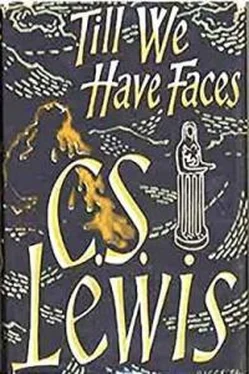They brought me into the upper room in her house where she sat at her spinning; very pale, but very calm. Calmer than I. Once I had been surprised that she was so much less beautiful than report had made her. Now, in her later years, she had won a new kind of beauty; it was a proud, still sort of face.
“Lady—Ansit,” I said, taking both her hands (she had not time to get them away from me), “what shall I say to you? How can I speak of him and not say that your loss is indeed without measure? And that’s no comfort. Unless you can think even now that it is better to have had and lost such a husband than to enjoy any man else in the world for ever.”
“The Queen does me great honour,” said Ansit, pulling her hands out of mine so as to stand with them crossed on her breast, her eyes cast down, in the court fashion.
“Oh, dear Lady, un–queen me a little, I beseech you. Is it as if you and I had never met till yesterday? After yours (never think I’d compare them) my loss is greatest. I pray you, your seat again. And your distaff; we shall talk better to that movement. And you will let me sit here beside you?”
She sat down and resumed her spinning; her face at rest and her lips a little pursed, very housewifely. She would give me no help.
“It was very unlooked for,” said I. “Did you at first see any danger in this sickness?”
“Yes.”
“Did you so? To me Arnom said it ought to have been a light matter.”
“He said that to me, Queen. He said it would be a light matter for a man who had all his strength to fight it.”
“Strength? But the Lord Bardia was a strong man.”
“Yes; as a tree that is eaten away within.”
“Eaten away? And with what? I never knew this,”
“I suppose not, Queen. He was tired. He had worked himself out; or been worked. Ten years ago he should have given over and lived as old men do. He was not made of iron or brass, but flesh.”
“He never looked nor spoke like an old man.”
“Perhaps you never saw him, Queen, at the times when a man shows his weariness. You never saw his haggard face in early morning. Nor heard his groan when you (because you had sworn to do it) must shake him and force him to rise. You never saw him come home late from the palace, hungry, yet too tired to eat. How should you, Queen? I was only his wife. He was too well–mannered, you know, to nod and yawn in a Queen’s house.”
“You mean that his work——?”
“Five wars, thirty–one battles, nineteen embassies, taking thought for this and thought for that, speaking a word in one ear, and another, and another, soothing this man and scaring that and flattering a third, devising, consulting, remembering, guessing, forecasting … and the Pillar Room and the Pillar Room. The mines are not the only place where a man can be worked to death.”
This was worse than the worst I had looked for. A flash of anger passed through me, then a horror of misgiving; could it (but that was fantastical) be true? But the misery of that mere suspicion made my own voice almost humble.
“You speak in your sorrow, Lady. But (forgive me) this is mere fantasy. I never spared myself more than him. Do you tell me a strong man’d break under the burden a woman’s bearing still?”
“Who that knows men would doubt it? They’re harder, but we’re tougher. They do not live longer than we. They do not weather a sickness better. Men are brittle. And you, Queen, were the younger.”
My heart shrivelled up cold and abject within me. “If this is true,” said I, “I’ve been deceived. If he had dropped but a word of it, I’d have taken every burden from him; sent him home for ever, loaded with every honour I could give.”
“You know him little, Queen, if you think he’d ever have spoken that word. Oh, you have been a fortunate queen; no prince ever had more loving servants.”
“I know I have had loving servants. Do you grudge me that? Even now in your grief, will your heart serve you to grudge me that? Do you mock me because that is the only sort of love I ever had or could have? No husband; no child. And you—you who have had all——”
“All you left me, Queen.”
“Left you, fool? What mad thought is in your mind?”
“Oh, I know well enough that you were not lovers. You left me that. The divine blood will not mix with subjects’, they say. You left me my share. When you had used him, you would let him steal home to me; until you needed him again. After weeks and months at the wars—you and he night and day together, sharing the councils, the dangers, the victories, the soldiers’ bread, the very jokes—he could come back to me, each time a little thinner and greyer and with a few more scars; and fall asleep before his supper was down; and cry out in his dream, ‘Quick, on the right there. The Queen’s in danger.’ And next morning—the Queen’s a wonderful early riser in Glome—the Pillar Room again. I’ll not deny it; I had what you left of him.”
Her look and voice now were such as no woman could mistake.
“What?” I cried. “Is it possible you’re jealous?”
She said nothing.
I sprang to my feet and pulled aside my veil. “Look, look, you fool!” I cried. “Are you jealous of this?”
She started back from me, gazing, so that for a moment I wondered if my face were a terror to her. But it was not fear that moved her. For the first time that prim mouth of hers twitched. The tears began to gather in her eyes. “Oh,” she gasped, “oh. I never knew … you also … ?”
“What?”
“You loved him. You’ve suffered too. We both … ”
She was weeping; and I. Next moment we were in each other’s arms. It was the strangest thing that our hatred should die out at the very moment she first knew her husband was the man I loved. It would have been far otherwise if he were still alive; but on that desolate island (our blank, un–Bardia’d life) we were the only two castaways. We spoke a language, so to call it, which no one else in the huge heedless world could understand. Yet it was a language only of sobs. We could not even begin to speak of him in words; that would have unsheathed both daggers at once.
The softness did not last. I have seen something like this happen in a battle. A man was coming at me, I at him, to kill. Then came a sudden great gust of wind that wrapped our cloaks over our swords and almost over our eyes, so that we could do nothing to one another but must fight the wind itself. And that ridiculous contention, so foreign to the business we were on, set us both laughing, face to face; friends for a moment, and then at once enemies again and for ever. So here.
Presently (I have no memory how it came about) we were apart again; I now resuming my veil; her face hard and cold.
“Well!” I was saying. “You have made me little better than the Lord Bardia’s murderer. It was your aim to torture me. And you chose your torture well. Be content; you are avenged. But tell me this. Did you speak only to wound, or did you believe what you said?”
“Believe? I do not believe. I know, that your queenship drank up his blood year by year and ate out his life.”
“Then why did you not tell me? A word from you would have sufficed. Or are you like the gods who will speak only when it is too late?”
“Tell you?” she said, looking at me with a sort of proud wonder. “Tell you? And so take away from him his work, which was his life (for what’s any woman to a man and a soldier in the end?) and all his glory and his great deeds? Make a child and a dotard of him? Keep him to myself at that cost? Make him so mine that he was no longer his?”
“And yet—he would have been yours.”
“But I would be his. I was his wife, not his doxy. He was my husband, not my house–dog. He was to live the life he thought best and fittest for a great man; not that which would most pleasure me. You have taken Ilerdia now too. He will turn his back on his mother’s house more and more; he will seek strange lands, and be occupied with matters I don’t understand, and go where I can’t follow, and be daily less mine; more his own and the world’s. Do you think I’d lift up my little finger if lifting it would stop it?”
Читать дальше











